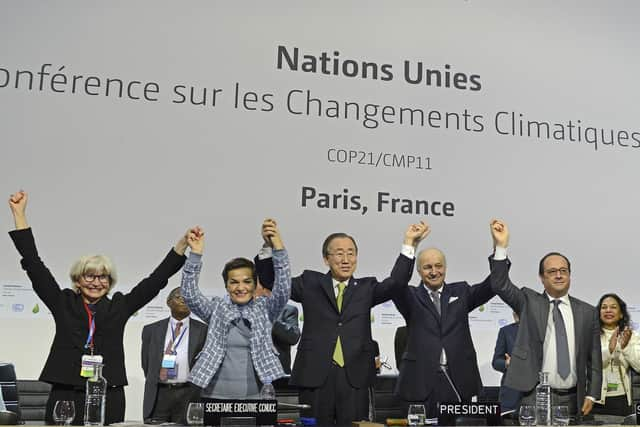Without climate change targets set in law, countries can act as they please - Dr Richard Dixon
A crucial issue is the voluntary nature of modern climate agreements. The Rio Climate and Biodiversity conventions were actual legally-binding agreements. The 1987 Kyoto Protocol also contained legally-binding targets but the US never ratified it, thanks to President Bush Jnr, even though it was President Bush Snr who agreed the Rio Climate Convention.
As many nations subsequently failed to deliver on the Rio targets they had signed up to or failed to confirm their Kyoto targets, any kind of legally-binding international agreement on climate became almost unthinkable.
Advertisement
Hide AdAdvertisement
Hide AdThe Paris Agreement of 2015 has no legal compulsion except for countries having to report what they have achieved (even if that is nothing) but even here many countries failed the last reporting deadline.
At the Paris talks there was a final plenary session to vote through the agreement. It all seemed to be going smoothly until we suddenly found ourselves in a break for urgent backroom discussions. It turned out that the US needed the word ‘would’ replaced with ‘should.’
Learning from the Kyoto Protocol failure, the negotiators knew that US Senators and Representatives would not allow the US to ratify an agreement which set legally-binding targets for their country. So they ‘should’ try to meet the targets rather than being obliged to actually meet them.
The Paris Agreement has a set of global aims, including keeping the planet’s final temperature rise well below 2ºC and ‘pursuing efforts to limit the temperature increase to 1.5°C.’ But action by any specific country is purely voluntary, with peer pressure supposed to make states offer enough for it all to add up to enough reduction in emissions.


The voluntary approach is deeply flawed but is working in some places. The EU negotiates as one unit and has made emissions reduction pledges for the whole bloc, dividing it up between countries internally, so balancing those who can go quickly against those who will take longer. These are difficult and frustrating discussions, similar to those last week which saw Hungary refuse to give up Russian oil.
China plans to double its solar and wind energy capacity by 2025 and its Paris pledge has been updated with a goal of seeing the country’s emissions peak before 2030 and then decline.
Despite its voluntary nature many companies took the Paris Agreement as a very strong indication of the direction of travel and the expectation from governments and customers that would come their way.
When the Earth Summit finished 30 years ago everyone knew it wasn’t aiming high enough but it was a start and much of it was legally binding. Subsequent voluntary agreements have helped some countries, blocs and companies to aim higher and to act, but they have also allowed those countries who want to carry on as usual the freedom to do so. Which is why the temperature rise is currently about 1.1ºC and all the pledges from Paris and since have us on track for 2.4ºC on the most optimistic estimates.
Dr Richard Dixon is an environmental campaigner and consultant
